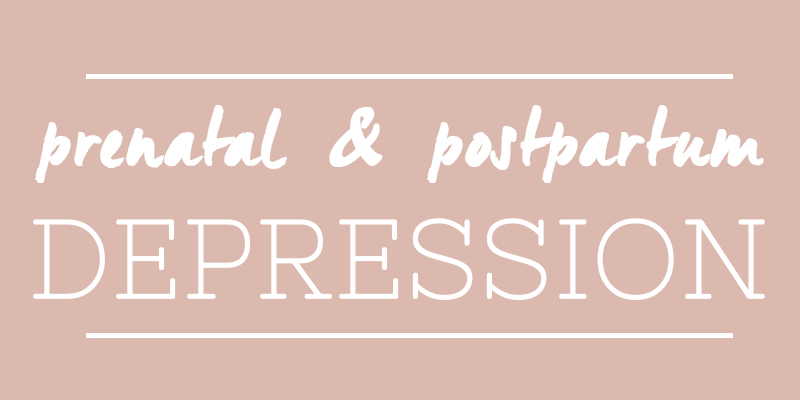Getting Back to Your Happy Self for the Best Moments of Your Life

Chrissy Teigen bravely spoke out about postpartum depression in a recent Glamour article. For many women, it’s a hard reality to learn that the happiest moments of your life can also bring significant physical and emotional changes, often making those moments feel desperate and sad. Pregnancy brings a lot of emotional and physical changes, but when are the mood swings and fatigue actually something else?
Postpartum depression has become something we talk about more now, thankfully, but many women might be surprised to know that prenatal depression or anxiety (also called antenatal depression or anxiety) is also a condition – and a pretty common one. In fact, the American Congress of Obstetricians and Gynecologists (ACOG) state that 14–23% of women will have some symptoms of depression during pregnancy. Other research found that up to 33% of pregnant women experience clinical depression or anxiety at some point in their pregnancies.
We all feel less than great at some points during pregnancy, and everyone worries about our little babe in there – that’s totally normal. But when a mum-to-be experiences symptoms that are more than the occasional “blah” feeling or nervousness and it interferes with every day life, that’s something to talk with your doctor about. Prenatal anxiety or depression can start in any trimester and is does not always strike postpartum. It can be tricky to diagnose, since so many symptoms can overlap with the general symptoms of pregnancy, and lets face it, for anyone that has been pregnant before you know you don’t always feel like a bunch of roses.
Also, while depression is something we talk about more, anxiety and OCD during and after pregnancy is not something that is addressed as often and can be crippling for a mother. We hear more often about the “baby blues” but how often do you hear about someone having obsessive thoughts or needing to wash their hands over and over? The truth is, the depression and anxiety can take on many forms and just because you don’t feel the way others describe it, doesn’t mean that you are not suffering from it to a greater or lesser degree.
A good rule of thumb to remember is this: if symptoms have been going on for more days than not or are interfering with the your daily functioning in some way, for two weeks or more, there might be something else going on than the usual pregnancy troubles. While life can be hard at times, don’t use it as an excuse for why you don’t feel happy nearly all of the time. You deserve to feel happy and function normally without your mood or anxiety getting in the way. But if they do, rest assured with the correct help, you can once again fully experience those happy early moments with your baby.
Here are some symptoms of depression or anxiety to watch out for:
- Persistent sense of loss of enjoyment/fun
- Feeling sad/empty most of the day, every day
- Trouble concentrating
- Difficulty sleeping or staying asleep all the time
- Excessive crying or irritability
- Feelings of guilt/hopelessness/worthlessness
- Extreme fatigue (that doesn’t have a biological cause, like low iron or thyroid problems)
- Constant worry
- Racing/churning and obsessive thoughts
- Sleeping or eating too much or too little
- Dizziness/hot flashes/racing heartbeat
- Tension or muscle aches
- Constant fear something bad is about to happen
Obsessive-compulsive disorder (OCD) and panic disorder are part of anxiety disorders and may also manifest during pregnancy. OCD can involve repetitive, obsessive thoughts, and impulses to do certain behaviors that need to feel any relief. With panic disorder, panic attacks occur; these can include rapid heartbeat, sweating or shaking, trouble breathing, and a strong, sudden impending sense of doom or danger. These attacks typically come out of nowhere.
There is no one specific cause of prenatal depression or anxiety – there are biological factors, as well as personal and social factors. During pregnancy, estrogen and progesterone increase 30 to 50 times their normal volume. If the placenta doesn’t make enough progesterone, depression can occur in some women. Other risk factors can include a personal history of depression or anxiety, going through infertility treatment, pregnancy complications, a previous pregnancy loss, financial stress, social isolation, and relationship conflict. Having said that, depression and anxiety can strike with out any apparent cause.
Untreated depression and anxiety during pregnancy can affect both mum and baby. In babies, studies have shown that these disorders are associated with lower Apgar scores, lower birth weight, premature birth, and babies born to these women are harder to soothe. Mum can experience effects such as self-harm, substance use, poor nutrition, preeclampsia, preterm labor, and an increased risk of postpartum depression.
You don’t have to suffer from prenatal depression or anxiety. There are treatments and support out there, and you haven’t done anything wrong. Pregnancy is a time to take care of you, and if that means seeking help for this from your doctor or another expert, then that’s just another sign that you are going to be a wonderful mom who does what is best for her child. If you feel as though your doctor is not responsive then find one who is. You know better than anyone how you feel.
Remember: seeking help isn’t a sign of weakness, but a sign of incredible strength and courage – you are doing the best thing for you and the baby, to ensure that both of you are healthy and happy.
Tags: anxiety, child birth, Chrissy Teigen, depression, motherhood, OCD, panic disorder, Postpartum Depression, pregnancy, pregnancy challenges
Comments are closed






